|
|
|
[Best viewed with Microsoft Internet Explorer]
nadeem@acm.org

Workbook of
Islamic Beliefs and Teachings
For Beginners
and Children
English Version of
Ta’leemul-Islaam
by
Allaamah Mufti Muhammad
Kifaayatullah

![]()
Bis-mil-laa hir-rah-maa nir-raheem.[1]
In the name of Allah, the Beneficient, the Merciful
![]()
Nah-ma-dul-laahal-a’liyyal-‘azeem, wa nu-sallee ‘alaa rasoolihil-kareem
We praise Allah, the Most High, Most Great, and pray for Allah’s blessings upon His noble Prophet.
Q. What is your name?
A. My name is Ahmad.
Q. What is the name of your religion?
A. Islam. And I am a Muslim.
Q. What does Islam teach?
A. Islam teaches that:
¨ Allah is one, and He alone should be worshipped, Hadrat Muhammad Mustafa (peace be upon him) is Allah’s worshipper and His Messenger, and the Noble Quran is the Book of Allah.
¨ Islam is the true religion. It teaches all good things about the here and the hereafter.
Q. What is the kalimah[2] of Islam?
A. The kalimah of Islam is:
![]()
Laa ilaa-ha il-lal-laa-hu muhammadur-rasoolul-laah
There is no god except Allah; Muhammad (peace be upon him) is His Messenger.
This kalimah is also called kalimah tauheed or kalimah tayyibah.
Q. What is kalimah shahaadah?
A. Kalimah shahaadah (kalimah of bearing witness) is:
![]()
Ash-hadu an-laa ilaaha il-lal-laa-hu wa ash-hadu an-na Muhammadan ‘ab-duhoo wa rasooluh
I bear witness that there is no god except Allah and I bear witness that Muhammad (peace be upon him) is Allah’s worshipper and His Messenger.
Q. What is imaan (faith)?
A. Imaan is to have faith in something and to proclaim it.
Q. What is our imaan mujmal (faith in a nutshell)?
A. Imaan mujmal is:

aamantu bil-laahi kamaa huwa bi as-maa-i-hi wa sifaatihi wa qabiltu jamee’a ahkaamihi. ‘iqraarum bil-lisaani wa tasdeequm bil-qalb.
I believe in Allah as He is with all His names and attributes and I accept all of His orders. It is said with the tongue and confirmed in the heart.
Q. What is our imaan mufas-sal (elaborated faith)?
A. Imaan mufas-sal is:

aamantu bil-laahi wa ma-laa-i-katihi wa kutubihi wa rusulihi wal-yaumil-aakhiri wal-qadri khairihi wa shar-rihi minal-laahi ta’aalaa wal-ba’thi ba’dal-maut.
I believe in Allah, in His angels, in His books, in His messengers, in the Day of Judgement, and (I believe) that all good and evil is decreed by Allah, and in the life after death.
Q. Who created you?
A. Allah created us, our fathers and mothers, the skies and the earth, this universe and everything in it.
Q. How did Allah create the universe?
A. By His power and command.
Q. What are the people called who do not believe in Allah?
A. They are called kaafir (unbelievers).
Q. What are the people called who do not worship Allah but worship other things, or those who believe in two or three gods?
A. Such people are called kaafir and mushrik.
Q. Will Allah pardon or forgive the mushrik or the kaafir?
A. Kaafir and mushrik will never be pardoned. They will always be kept in great pain and trouble in the hereafter.
Q. Who was Hadrat
Muhammad (![]() )[3]
?
)[3]
?
A. Hadrat
Muhammad (![]() )
was Allah’s worshipper and a Prophet and a Messenger of Allah. We belong to his
ummah.
)
was Allah’s worshipper and a Prophet and a Messenger of Allah. We belong to his
ummah.
Q. Where was our
Prophet Muhammad (![]() )
born?
)
born?
A. He was born in Makkah, a city in Arabia.
Q. What were the names of his father and grandfather?
A. ‘Abdullah was the name of his father and ‘Abdul-Muttalib was the name of his grandfather.
Q. Was our Prophet
Muhammad (![]() )
greater or lesser in position than the other prophets?
)
greater or lesser in position than the other prophets?
A. Our Prophet (![]() )
was the greatest of all prophets. He is the holiest of all creation.
)
was the greatest of all prophets. He is the holiest of all creation.
Q. Where did the
Prophet Muhammad (![]() )
live all his life?
)
live all his life?
A. He remained in the city of his birth, Makkah, for 53 years. Then he went to the Holy City of Madinah in obedience to the Command of Allah. There he lived for 10 years. He left for his heavenly abode at the age of 63.
Q. What about a
person who does not believe in Prophet Muhammad (![]() ) ?
) ?
A. One who does not
accept Hadrat Muhammad (![]() ) as
Allah’s prophet is a kaafir.
) as
Allah’s prophet is a kaafir.
Q. What is meant by
believing in Hadrat Muhammad (![]() ) ?
) ?
A. To believe in Hadrat
Muhammad (![]() )
means that we accept him as the Prophet and Messenger of Allah, and that we
should love him more than everything except Allah, and that we should obey his
orders.
)
means that we accept him as the Prophet and Messenger of Allah, and that we
should love him more than everything except Allah, and that we should obey his
orders.
Q. How do we know
that Hadrat Muhammad (![]() ) is
Allah’s Prophet and Messenger?
) is
Allah’s Prophet and Messenger?
A. It is because
the Holy Book, the Quraan, bears witness to his prophethood and he (![]() ),
in his words and actions, maintained a standard of life to which only prophets
can rise. Hadrat Muhammad (
),
in his words and actions, maintained a standard of life to which only prophets
can rise. Hadrat Muhammad (![]() )
bore witness to his prophethood and he never lied in his entire life.
)
bore witness to his prophethood and he never lied in his entire life.
Q. How do we know that the Holy Quraan is Allah’s book?
A. Because Hadrat
Muhammad (![]() )
said it is a Book of Allah and it was revealed to him by Allah. Its teachings
and its style of expression are unmatched and it surpasses and eludes human
skill and wisdom.
)
said it is a Book of Allah and it was revealed to him by Allah. Its teachings
and its style of expression are unmatched and it surpasses and eludes human
skill and wisdom.
Q. Was the Holy
Quraan revealed to Hadrat Muhammad (![]() )
all at once or in parts?
)
all at once or in parts?
A. The Holy Book
was revealed to Prophet Muhammad (![]() ) in
parts. Sometimes one ayah (verse) and
sometimes two or more ayaat (verses)
and sometimes one whole surah
(chapter) was revealed, according to the need.
) in
parts. Sometimes one ayah (verse) and
sometimes two or more ayaat (verses)
and sometimes one whole surah
(chapter) was revealed, according to the need.
Q. How long did the Quraan take for its complete revelation?
A. Twenty-three years.
Q. How was the Holy
Quraan revealed to the Prophet Muhammad (![]() ) ?
) ?
A. The Holy Quraan
was revealed through the angel Jibreel (peace be upon him). He would come to
the Prophet (![]() )
and recite before him one ayah or one
surah which the Prophet (
)
and recite before him one ayah or one
surah which the Prophet (![]() )
would remember and then get it written down by someone while many others
memorized it.
)
would remember and then get it written down by someone while many others
memorized it.
Q. Why did the
Prophet (![]() )
not write himself?
)
not write himself?
A. Because the
Noble Prophet (![]() )
was ummiy.
)
was ummiy.
Q. What is ummiy?
A. A person who did
not learn to read and write from any human being is called ummiy. Although the Prophet (![]() )
did not receive any customary schooling, Allah bestowed upon him knowledge, the
like of which is not found anywhere else in the world.
)
did not receive any customary schooling, Allah bestowed upon him knowledge, the
like of which is not found anywhere else in the world.
Q. Who is angel Jibreel (peace be upon him) ?
A. An angel who brought Allah’s orders to His prophets and messengers.
Q. How do Muslims adore and worship Allah?
A. They say salaah (namaaz), keep fasts (saum), give zakaat and perform hajj.
Q. What is salaah or namaaz?
A. Salaah is a special way of
worship and prayer taught by Allah in the Holy Quran, elucidated and explained
practically by His apostle, Muhammad (![]() ),
in ahaadeeth (traditions).
),
in ahaadeeth (traditions).
Q. How is salaah performed?
A. Salaah is performed by standing before Allah facing the Qiblah, with hands crossed on the belly, in the mosque or at home, reciting the Quran, praising Allah’s greatness, bowing to Him in respect and putting the forehead on the ground to show humility to Him.
Q. Observing prayer – is it done in the masjid (mosque) or in the home?
A. Allah is Omnipresent (present everywhere and at all times)- whether a man or woman present themselves before Allah in the vicinity of a masjid or within the four walls of their house. You can say your prayers at home or in a mosque- Allah is everywhere. But for men there is greater reward in observing the prayers in a masjid.
Q. One has to wash the face, hands and feet before the salaah: what is that called?
A. It is called wudu’ (ablution). Salaah done without wudu’ is not acceptable and not valid.
Q. To which direction should a Muslim turn his or her face while offering prayer?
A. Towards Makkah.
Q. Why has it been ordered to turn one’s face to Makkah?
A. Since it is in Makkah that the sacred house of Allah is located. It is called the Ka’bah. One must turn one’s face towards the Ka’bah while offering namaaz.
Q. What name do we give to the direction of our prayer?
A. It is called Qiblah.
Q. How many times is the salaah offered during the whole day and night?
A. It is compulsory (obligatory) to say salaah five times during the day and night.
Q. What are the names of those five salaat?
A. They are:
¨ The first one, which is said before the sunrise, is called Fajr.
¨ The second one, offered in the afternoon, is called Zuhr.
¨ The third one, said in the late afternoon before sunset, is ‘Asr.
¨ The fourth, said just after sunset, is Maghrib.
¨ The fifth, said one and a half or two hours after sunset, is called ‘Ishaa.
Q. What is Adhaan (call for prayer) ?
A. When the time for salaah comes, a man stands up before the prayer and calls aloud these words[4]:
![]()
Allaahu akbar – Allah is the Greatest (4 times)
![]()
Ash-hadu an-laa ilaaha il-lal-laah – I bear witness that there is no god except Allah (2 times)
![]()
Ash-hadu an-na Muhammadar-rasoolul-laah – I declare that Muhammad is Allah’s Messenger (2 times)
![]()
Hay-ya ‘alas-salaah – Come for salaah (2 times, turning the head to the right both times)
![]()
Hay-ya ‘alal-falaah – Come to success (2 times, turning the head to the left both times)
![]()
Allaahu akbar – Allah is the Greatest (2 times)
![]()
Laa ilaaha il-lal-laah – There is no god except Allah.
These words are called adhaan. In the adhaan of Fajr after Haiy-ya ‘alal-falaah, say 2 times:
![]()
As-salaatu khairum-minan-naum – Prayer is better than sleep.
Q. What is iqaamah or takbeer (magnification of the Lord) ?
A. When people stand up for salaah, a person repeats the words of adhaan, this is called iqaamah or takbeer. The words of adhaan are repeated exactly the same in iqaamah but, after hay-ya ‘alal-falaah, one says 2 times:
![]()
Qad qaamatis-salaah – The prayer is ready.
Q. What name is given to the person who recites adhaan or takbeer?
A. The person who recites adhaan is called mu-adh-dhin and the one who recites takbeer is called mukab-bir.
Q. When many people assemble and say salaah together, what do we call it? What name do we give to the person who leads the salaah? And what are the persons who pray salaah behind him called?
A. Salaah which is offered, not individually, but along with other people is called salaah bil-jamaa’ah (namaaz ba jamaa’at or “prayer in congregation”). The person who leads the jamaa’ah is called the imaam. A person who says salaah behind the imaam is known as a muqtadi.
Q. What is the person called who says salaah alone?
A. He is called munfarid (“solitary” or “isolated”).
Q. What is the house called that is specially build for salaah and where the people pray salaah in jamaa’ah?
A. Such a place is called a masjid (mosque).
Q. What should one do in a masjid?
A. One should offer salaah, read the Holy Quran or wazeefa or sit silently and respectfully. It is very bad to play, jump, make noise or talk of worldly affairs in a masjid.
Q. What are the benefits of salaah?
A. There are many benefits. Here we will tell you some of them:
¨ The body and clothes of a namaazi (musalli or one who prays salaah ) are always neat and clean.
¨ Allah, the Almighty, is pleased with one who says salaah.
¨ Prophet
Muhammad (![]() ) is
pleased with a musalli.
) is
pleased with a musalli.
¨ Allah, the Almighty, favours those who pray salaah.
¨ Good men hold a musalli in high esteem.
¨ A musalli is saved from many evil deeds.
¨ Allah, the Almighty, keeps a musalli in peace and comfort after his death.
Q. What are the names of the expressions or phrases said in salaah?
A. The names of the expressions said in salaah are:
![]() - Takbeer
- Takbeer
![]() - Thana
- Thana
![]() - Ta-‘aw-wudh
- Ta-‘aw-wudh
![]() - Tasmiyah
- Tasmiyah
![]() - Qira’at : Fatihah and
another Surah or aayaat
- Qira’at : Fatihah and
another Surah or aayaat
![]() - Tas-beeh of ruku’
- Tas-beeh of ruku’
- Tas-mee’a of ruku’ (![]() )
)
- Tahmeed of ruku’
- Tasbeeh of sajdah (![]() )
)
![]() - Tashah-hud
- Tashah-hud
![]() - Darood
- Darood
![]() - Du’a after darood
- Du’a after darood
![]() - Salaam
- Salaam
Q. What are the wordings of the above mentioned expressions? Please recite a few surah as well.
A. The wordings of the expressions are:
Takbeer:
![]()
Allaahu akbar
Allah is the Greatest
Thana:

Subhaanakal-laahum-ma wa bi hamdika wa tabaarakas-muka wa ta’aalaa jad-duka wa laa ilaaha ghairuk
O Allah! Glory and Praise are for You, and blessed is Your name, and exalted is Your majesty; and there is no god except You.
Ta-‘aw-wudh:
![]()
A’oodhu bil-laahi minash-shaitaanir-rajeem
I seek refuge with Allah from the condemned Shaitaan.
Tasmiyah:
![]()
Bismillaahir-rahmaanir-raheem
In the name of Allah, Most Gracious, Most Merciful
Qira’at:
Suratul-Faatihah
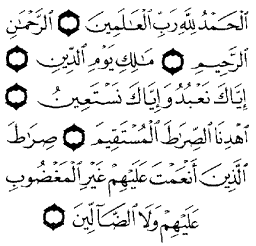
All praise is for Allah, the Sustainer of the worlds; Most Gracious, Most Merciful; Master of the Day of Judgment. Thee do we worship and Thee alone do we ask for help. Guide us to the straight way – the way of those upon whom Thou has bestowed Thy blessing; not those who earn Thy anger nor those who go astray.
Suratul-Kauthar

Lo! We have given you Abundance; So pray unto your Lord and sacrifice. Lo! It is your insulter who is without posterity.[5]
Suratul-Ikhlaas

Say: He is Allah, the One! Allah, the eternally Besought of all! He begets not nor was He begotten. And there is none comparable to Him.[6]
Suratul-Falaq

Say: I seek refuge in the Lord of the Daybreak; From the evil of that which He created; From the evil of the darkness when it is intense, and from the evil of malignant witchcraft, and from the evil of the envier when he envies.[7]
Suratun-Naas
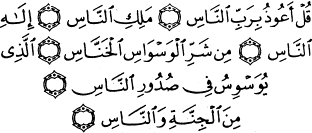
Say: I seek refuge in the Lord of mankind, the King of mankind, the God of mankind, from the evil of the sneaking whisperer, who whispers in the hearts of mankind – of the jinn and mankind.[8]
Tasbeeh of ruku’:
![]()
Subhaana rab-biyal-‘azeem
Glory be to my Lord, the Great
Tasmee’a of ruku’:
![]()
Sami’al-laahu li man hamidah
Allah hears the one who praises Him
Tahmeed of ruku’:
![]()
Rab-banaa lakal-hamd
Our Lord, praise be to You
Tasbeeh of sajdah:
![]()
Subhaana rab-biyal-a’laa
Glory be to my Lord, the Highest
Ta-shah-hud:
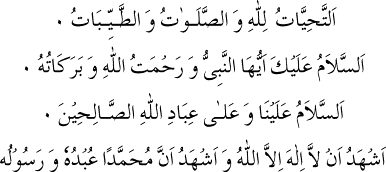
At-tahiy-yaatu lil-laahi was-salawaatu wat-tay-yibaatu. As-salaamu ‘alaika ay-yuhan-nabiy-yu wa rahmatul-laahi wa barakaatuh. As-salaamu ‘alainaa wa ‘alaa ‘ibaadil-laahis-saaliheen. Ash-hadu an laa ilaaha il-lal-laahu wa ash-hadu an-na Muhammadan ‘abduhu wa rasooluh.
All prayer is for Allah and worship and goodness. Peace be upon you, O Prophet, and the mercy of Allah and His blessings. Peace be upon us and upon the righteous servants of Allah. I bear witness that there is no god except Allah, and I bear witness that Muhammad is His servant and messenger.
Darood shareef:
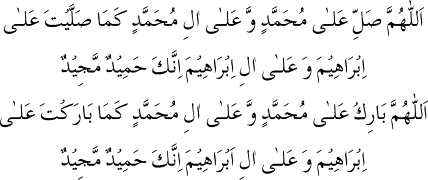
Allaahum-ma salli ‘alaa Muhammadi(n)w-wa ‘alaa aali Muhammadin kamaa sal-lay-ta ‘alaa Ibraaheema wa ‘alaa aali Ibraaheema in-naka hameedum-majeed. Allaahum-ma baarik ‘alaa Muhammadi(n)w-wa ‘alaa aali Muhammadin kamaa baarakta ‘alaa Ibraaheema wa ‘alaa aali Ibraaheema in-naka hameedum-majeed.
O Allah, let Your blessing come upon Muhammad and the family of Muhammad as You blessed Ibrahim and his family. Truly You are the Praiseworthy, the Glorious.
O Allah, bless Muhammad and the family of Muhammad as You blessed Ibrahim and his family. Truly You are the Praiseworthy, the Glorious.
Du’a after darood:
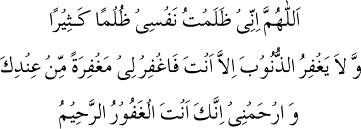
Allaahum-ma in-ni zalamtu nafsiy zulman katheera(n)w-wa laa yaghfirudh-dhunooba il-laa an-ta faghfir-liy maghfiratam-min ‘indika war-ham-niy in-naka antal-ghafoorur-raheem.
O Allah! I have been unjust to myself and no one grants pardon for sins except You. Therefore, forgive me with Your forgiveness and have mercy on me. Surely, You are the Forgiver, the Merciful.

O Lord! Make me and my children steadfast in salaah. Our Lord! Accept the prayer. Our Lord! Forgive me and my parents and the believers on the Day of Judgement.[9]
Salaam:
![]()
As-salaamu ‘alaikum wa rahmatul-laah
Peace and blessings of Allah be upon you.
Du’a after prayers:

Allaahum-ma an-tas-salaamu wa min-kas-salaamu, tabaarak-ta yaa dhal-jalaali wal-ikraam
O Allah! You are the bestower of peace, and from You comes peace. Blessed are You, O Lord of Glory and Honor.
Du’a qunoot:
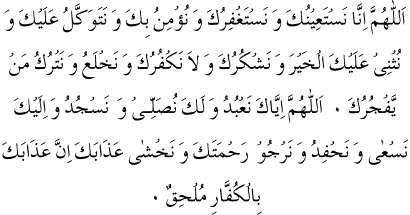
Allaahum-ma in-naa nasta’eenuka wa nastaghfiruka wa nu’minu bika wa natawak-kalu ‘alaika wa nuthni ‘alaikal-khair wa nashkuruka wa laa nakfuruka wa nakhla’u wa nat-ruku ma(n)y-yafjuruk. Allaahum-ma iy-yaaka na’budu wa laka nusal-li wa nasjudu wa ilaika nas’aa wa nah-fidu wa narju rahmataka wa nakhshaa ‘adhaabaka, in-na ‘adhaabaka bil-kuf-faari mul-hiq.
O Allah! We ask Thy help and ask for Thy pardon and believe in Thee and rely upon Thee. And we praise Thee in the best way and we thank Thee and we are not ungrateful to Thee. And we cast off and leave one who disobeys Thee. O Allah! Thee alone we worship and to Thee do we pray and prostrate. And to Thee to we turn in haste. And we hope for Thy blessings and fear Thy punishment. Truly Thy punishment is for the disbelievers unavoidable.
Q. How to do wudu’ ?
A. Sit at a high place. Take clean water in a clean pot. It is better to face the Qiblah but if there is no possibility of it, there is no harm. Roll up your sleeves to your elbows; then recite Bismillaah and wash both the hands up to the wrists, three times.
Then gargle three times and brush your teeth. If you do not have a brush or miswaak, rub your teeth with your (right index) finger.
Then put water into your nostrils three times and clean them with your left little finger, then wash your face three times. Do not splash water on your face with force but run water on the forehead softly and wash from the forehead down to the chin and on either side of the face up to the ears.
Then wash the right arm up to the elbow three times, and do the same with the left arm.
Then wet your hands and pass them over the head, ears and neck. This is called masah. Masah should be done on each part only once.
Then wash each foot three times up to the ankle, first the right foot, then the left.
Q. How to perform the salaah?
A. The method of performing salaah is:
After performing wudu’, stand upright facing the Qiblah at a clean place, dressed in neat and clean clothes.
Then say niyyah (intention), raise both hands up to the ears and say Allaahu akbar, then cross them on the belly below the navel.[10] Put the right hand on top of the left one.
Do not look hither and thither while saying prayers.[11] Stand with respect and full attention to Allah.
After crossing the hands, recite thana, then ta-‘awwudh and tasmiyah. Then recite al-Faatihah. After finishing al-Faatihah, say softly “aameen.” Then recite another surah that you know.
Then say Allaahu akbar and bow for ruku’. In the ruku’, catch hold of the knees with your hands and say the tasbeeh for ruku’ three or five times. Then, saying tasmee’a stand upright again and also say tahmeed.
Then, saying takbeer, prostrate for sajdah. Put your knees on the ground first, then hands and then place your nose and then forehead on the ground. Say tasbeeh of sajdah three or five times. Then say takbeer and get up and sit upright. Sit for a few moments and then say takbeer and perform the second sajdah in the same way.
Then say the takbeer again and stand up without putting your hands on the ground.
This is one complete raka’ah and the next one begins. After tasmiyah, recite al-Faatihah again and add another surah.
Then perform ruku’, qaumah (standing up), and the two sajdah. Get up and sit upright from the second sajdah and recite tashah-hud, then darood shareef and du’a and then perform the salaam – first turning your face to the right and then towards the left. Two raka’at have been completed.
After the salaam, recite the du’a:

Allaahum-ma an-tas-salaamu wa min-kas-salaamu, tabaarak-ta yaa dhal-jalaali wal-ikraam
O Allah! You are the bestower of peace, and from You comes peace. Blessed are You, O Lord of Glory and Honor.

Our Lord! Grant us the good of this world and the good of the Hereafter and save us from the torment of the hell-fire.[12]
For du’a, raise your hands up, but do not raise them too high. They should not be above the shoulders. After finishing du’a, rub both hands over your face.
Q. How to sit between the two sajdah, or when reciting tashah-hud ?
A. Have your right foot upright with its toes facing qiblah and lay down the left foot and sit on it. Both the hands should rest on the knees while sitting so.
Q. Is there any difference between the salaah of the imaam, munfarid (one praying alone) or muqtadi (one following the imaam) ?
A. Yes, there is a little difference. That is that the imaam and munfarid recite thana, ta‘awwudh, tasmiyah and do qira’at in the first raka’ah. In the second raka’ah, they recite tasmiyah, al-Faatihah and another surah.
But the muqtadi says only thana in the first raka’ah and after that he stands silent in all the rest.
Another difference is that after ruku’ the imaam and munfarid say “Sami ‘al-laahu li man hamidah.” While the munfarid can also say the tahmeed as well, the muqtadi only says the tahmeed.
Q. How to offer salaah of 3 or 4 raka’at ?
A. The first two raka’at should be said in the same way as explained above. And in the qa’ada (sitting), darood shareef should not be recited after tashah-hud. Instead, stand up saying takbeer.
If the salaah is waajib, sunnah or nafl then in the following raka’at recite tasmiyah, al-Faatihah and another surah. If it is a fard salaah, then in the third and fourth raka’at only al-Faatihah but not another surah should be recited.
Complete the three or four raka’at and then sit in the qa’ada and recite tashah-hud, darood and du’a and then say salaam, ending the three or four raka’at.
Q. Can we say three raka’at of sunnah or nafl prayer?
A. No. Sunnah and nafl salaah are said in units of two or four raka’at, never three.
Q. What is the correct way of doing ruku’ ?
A. For ruku’, the head and waist should be on the same level. The head should neither be higher nor lower than the waist-line and both the hands should be kept away from the ribs and the knees be held tightly.
Q. What is the correct way of doing sajdah ?
A. Sajdah should be done in such a way that the palms rest on the ground, the wrist and elbows are raised from the ground. The abdomen should not touch the thighs. The hands should be kept away from the ribs also.
Q. What is counted on the fingers after saying the prayers?
A. Subhaanallaah 33 times; Al-hamdu lil-laah 33 times; and Allaahu akbar 34 times. There is great reward in doing so.
An effort has been made to transliterate Arabic words as intuitively and correctly as possible. However, because of the lack of direct correspondence between the English and Arabic alphabets, the transliterated words are only approximations of the Arabic originals.
An
earnest appeal is made to the reader to please inform the publishers if any
errors or shortcomings are discovered in this publication so that further
editions may be improved. Your cooperation is much appreciated.
* Based upon Taleem-ul-Islam by Allaama Mufti Muhammad Kifaayatullah. Translation by Dr. Mahmood Qaderi. (Sh. Muhammad Ashraf, Lahore, Pakistan. 1981.)
[1] In this first part of Teachings of Islam we will provide English transliteration of the Arabic text. It is necessary, however, to learn enough Arabic to be able to read it fluently. Under a qualified teacher, it is not difficult to learn to read Arabic. In the next three parts of Teachings of Islam, we will only provide Arabic text and the English meaning. (See the end of this book for a description of the transliteration scheme.)
[2] Kalimah literally means “word” or utterance or proclamation.
[3] After the
name of the Prophet Muhammad (![]() ),
Muslims must say: Sal-lal-laahu ‘alaihi
wa sal-lam. “Peace and blessings of Allah be upon him.” “Hadrat”
is a title of respect.
),
Muslims must say: Sal-lal-laahu ‘alaihi
wa sal-lam. “Peace and blessings of Allah be upon him.” “Hadrat”
is a title of respect.
[4] In order to summon all the Muslims in the neighborhood to the salaah.
[5] Surah 108.
[6] Surah 112.
[7] Surah 113.
[8] Surah 114.
[9] Surah 14, Ayaah 40.
[10] For women, they should cross their hands upon their chest.
[11] Your eyes should be fixed upon the place where your forehead touches during sajdah.
[12] Surah 2, Ayaah 201.